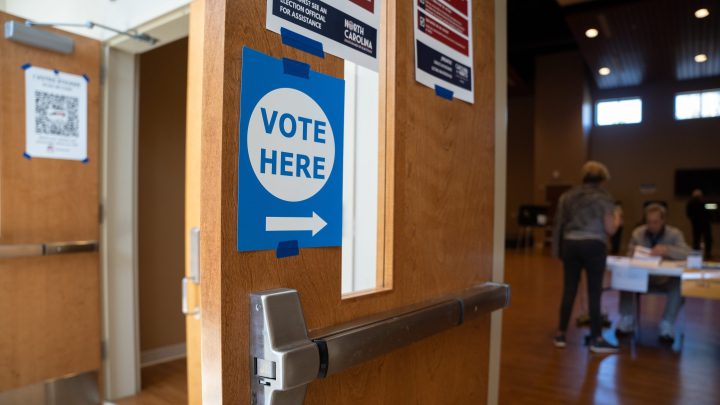
How a lack of local news coverage may have played a role in a 2018 election scandal
How a lack of local news coverage may have played a role in a 2018 election scandal

They say all politics is local. So where’s the local news coverage this election year? Members of the “Marketplace Morning Report” team have been traveling to what are called “news deserts” in Super Tuesday states to hear about the business models that are failing or informing voters as they make their choices on Tuesday. Earlier in the week, we reported from Val Verde County, Texas. Today, we go to North Carolina, where sparse local news coverage may have played a part in a congressional election so questionable, there was a do-over.
In the fall of 2018, a Baptist minister named Mark Harris seemed to win a seat in Congress by about 900 votes. Emphasis on seemed.
“It not only happened in my own state, it had happened in the congressional district — the North Carolina 9th Congressional District — that I lived in at that point,” said media scholar Penny Muse Abernathy, one of the foremost experts on declining local news coverage in America. She’s now with the Medill School of Journalism at Northwestern University.
“What later became apparent is that all of the difference could be attributed to absentee ballots that had been cast in at least one of the counties,” she went on.
According to WCNC in Charlotte, some voters claimed that strangers offered to collect their ballots and even fill them out. The case was ugly. The candidate’s own son, a U.S. attorney, testified that he had warned his father about hiring a political operative who offered sketchy services.
In a very rare occurrence in a race for U.S. Congress, officials ordered a new election. A blockbuster story, yet Abernathy noticed coverage was only minimal.
You’d think evidence of election fraud would be the talk of the district and drive voters in the special election to the polls to make sure their vote got counted. Instead, turnout was down by a third from the first election.
Abernathy draws a line from voter apathy to the desertification of local news.
“What we’ve seen over the last 20 years, as the quality and quantity of our local news has dropped precipitously, so has participation in local elections,” she said.
And there’s another feature about this sorry tale that disturbs people worried about the decline of local news: It’s how the election shenanigans first came to light. It wasn’t a local Woodward- or Bernstein-style reporter on the beat.
“No, it absolutely wasn’t,” Abernathy said. “The real uncovering of this came from political scientists who were looking and noticing immediately the anomaly occurring with election returns in one specific county.”
The absentee ballots were weird in Bladen County. It has a paper, the Bladen Journal, but given what’s happening with the internet and ad revenue, it doesn’t have the reporting staff papers used to have when Abernathy started out in the business nearby.
“They have to be very selective about the stories they cover,” she said. “You just don’t have the bandwidth to do it.”
The political operative in the absentee ballot scandal was charged but died before a trial. Mark Harris was never charged with anything and is now running for Congress in the Republican primary next week.
And who needs local papers if we have phones full of headlines and push notifications?
“What travels on your cell phone, way more than 95% of that is national news,” Abernathy said. “So, you know, we used to say all politics is local, but in the absence of local news, all politics and all news becomes national.”
The Local News Initiative at Medill tracks news deserts, as well as solutions, including social entrepreneurs who work to fill in gaps in local coverage.
Based in Durham, a nonprofit called Carolina Public Press doesn’t see itself as a replacement for local newspapers. But with a roster of freelancers and two staff reporters, it has been able to do investigative work that moves the needle.
“Either with our digital platform, and/or partnerships with other news organizations, like radio,” explained Lisa Lopez, Carolina Public Press’ interim executive director. “And we find out what topics they would like to see us cover, as well as how they would like to receive the news.”
Such as texting news stories to readers in rural counties with spotty internet. Editor-in-chief Frank Taylor said his team has reported on weaknesses in state law leading to low rates of prosecution for sexual assault.
“And as a result of our reporting, legislation passed. It passed unanimously in the legislature, which, if you know the North Carolina legislature, it can be a toxically partisan place,” he said.
Innovations to try to “irrigate” and “replant” news deserts are happening around the country. After the Oxford Press in Ohio folded for good a month ago, students at nearby Miami University jumped in, adding a local news section to the student newspaper. In Maine, many for-profit newspapers were rolled up last year into a single nonprofit umbrella organization. But also popping up are news-like publications filled with algorithm-generated content and items that look like news but are really partisan talking points.
On Thursday, we cross the border to Virginia to visit a news desert surprisingly close to Washington, DC.
There’s a lot happening in the world. Through it all, Marketplace is here for you.
You rely on Marketplace to break down the world’s events and tell you how it affects you in a fact-based, approachable way. We rely on your financial support to keep making that possible.
Your donation today powers the independent journalism that you rely on. For just $5/month, you can help sustain Marketplace so we can keep reporting on the things that matter to you.












